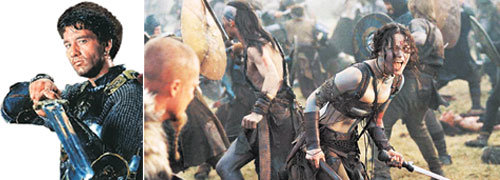The Knights of the Round Table Go Beating about the Bush
The Knights of the Round Table Go Beating about the Bush
Posted July. 15, 2004 22:18,

The highlight of the new film version of King Arthur is not in the moment when the eponymous would-be-monarch pulls Excalibur out of the stone and strikes his heroic stance.
The movie claims instead that Arthur is the son of a Roman father and a Briton mother, that the Knights of the Round Table are Sarmatian warriors uprooted from their faraway homeland to serve out their military duty for the Roman Empire, and that Guinevere is a Wold Amazon covered with exotic tattoos from head to foot. It seeks to stand apart from preceding renditions of the Arthurian legend through the impact and implications of its new interpretation and historical premise.
Unfortunately, this seemingly super-sized movie has overlooked a critical fact: the audience it woos will not be coming to the theater out of their intellectual thirst to dig out the hidden kernels of history behind the myth, but simply out of their desire to get some good old fun and excitement. King Arthur resembles a student who putters about trying to do applied mathematics without being able to add or subtract. If youre going to be a self-proclaimed blockbuster, then the least you can do is be really loud or really extravagant.
Sent to defend Romes dominion over Britain, Commander Artorius Castus (played by Clive Owen) leads a band of famed Sarmatian knights who have been conscripted for military service. On the day that their term of service is to expire, the knights are given one final mission: to rescue Alecto, heir apparent to the Pope in Rome, isolated in the north of Britain by the invading Saxons and the native Wolds. Arthur and his knights manage to return with Alecto through extreme peril, but the Saxons follow them south in the thousands. Lancelot and his fellow Sarmatian knights are faced with the decision to either return home as free men or stake their lives and stand by Arthur, who has chosen to stay and defend Britain against the barbaric invaders.
With neither the desperation of Gladiator, the scale of The Lord of the Rings, nor the painstaking detail of Troy, the action of King Arthur is too deficient in imagination to stimulate the jaded appetite of todays audiences. After the initial sampling of armed conflict we get at the opening of the film, the movie meanders for over an hour without pace or suspense while the audience waits for the next big fight scene. The heroes flourish their swords with earnest determination, but their opponents strangely lack gruesomeness or horror (theres hardly any spurting blood, even). The battles are neither lavish and romantic, nor gritty and realistic.
Arthur and his knights seem herded about by a flat screenplay, with no real sense of dimension or weight as characters; they fail to demonstrate any anguish over their performances, let alone any real human anguish. The most conspicuous figure, Guinevere (Keira Knightley), vacillates sporadically between being a proper lady and being Lara Crawford (the female warrior-archeologist from Tomb Raider), without enough context to explain why she might be behaving in such a way. The grand lines spoken by King Arthur (Lancelot, I can do this, but only with you by my side!), Guinevere (We cannot know what tomorrow brings.), and Cedric, the cruel leader of the Saxons (Finally, a man worth killing!), tend to freeze the characters in place rather than resonate with significance.
And this is why the music of King Arthur ends up clashing with the scenes it is intended to elevate. Hans Zimmers score rises to a stirring crescendo, trying its best to wreak havoc with the audiences emotions, but the accompanying images on the big screen are devoid of dynamism: the result is a bunch of blasé people fidgeting in their seats.
Directed by Antoine Fuqua, of The Replacement Killers and Training Day. For audiences 15 and over.
Seung-Jae Lee sjda@donga.com
Headline News
- Joint investigation headquarters asks Yoon to appear at the investigation office
- KDIC colonel: Cable ties and hoods to control NEC staff were prepared
- Results of real estate development diverged by accessibility to Gangnam
- New budget proposal reflecting Trump’s demand rejected
- Son Heung-min scores winning corner kick







